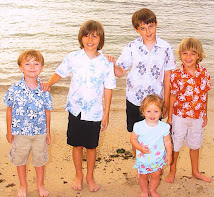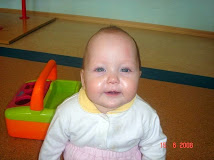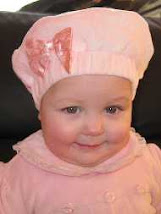
In order for our IA Doctors to make the best medical evaluation possible, it is important that we provide them with good photos. They will need two close-up photos of the child’s face: one with the child looking directly into the camera, and another from a 45º angle. Sounds easy enough right? Oh, and the child's mouth must be closed, she can't be smiling and her eyes need to be wide open. And one more thing; she will need to have a 1/2" round sticker on her forehead. Okay, that might be a little more tricky...
This is when I become even more thankful for digital photography. You can't imagine how much film I used to go through each November and December trying to get the "perfect" Christmas photo of the boys. (It took several years with kiddos to discover that there is no such thing! ) At least with digital, you know right then and there if someone was looking down, another one was giving a cheesy smile, the other put his finger in his nose just as the shutter clicked. While my standards for Christmas photos has greatly diminished over the years, when it comes to taking photos of the little girl in Russia who will be referred to us, I feel like I really need to get it right. The future of our entire family depends on it! How’s that for pressure?
Why is this so important?
Because without proper photos of a child, it is not possible to diagnose FAS without physically examining the child in the doctor’s office. My biggest concern when Martin and I started down the IA path (especially from Russia) was that it would be difficult to be matched with a relatively healthy child. Alcoholism has been a problem in Russia for years and there are no public health programs to educate women about the dangerous effects of drinking during pregnancy. According to the CDC, when a pregnant woman drinks alcohol, so does her unborn baby. And if that baby ends up in an orphanage, he/she is no less deserving of loving adoptive parents than the baby who was not exposed to alcohol. What I have discovered, however, after reading literally hundreds of success stories, that it is a myth to say most Russian children offered for adoption have FAS or FAE.
So what is exactly is FAS or FAE?
 Fetal Alcohol Syndrome (FAS) is a birth defect syndrome caused by maternal alcohol consumption during pregnancy. Alcohol in a pregnant woman's bloodstream circulates to the fetus by crossing the placenta. There, the alcohol interferes with the ability of the fetus to receive sufficient oxygen and nourishment for normal cell development in the brain and other body organs. FAS is characterized by facial features such as a thin upper lip, low nasal bridge, fold on inner eyelid, flat midface, short nose, indistinct philtrum (the ridge between upper lip and nose is barely visible.)
Fetal Alcohol Syndrome (FAS) is a birth defect syndrome caused by maternal alcohol consumption during pregnancy. Alcohol in a pregnant woman's bloodstream circulates to the fetus by crossing the placenta. There, the alcohol interferes with the ability of the fetus to receive sufficient oxygen and nourishment for normal cell development in the brain and other body organs. FAS is characterized by facial features such as a thin upper lip, low nasal bridge, fold on inner eyelid, flat midface, short nose, indistinct philtrum (the ridge between upper lip and nose is barely visible.)Many children exposed to alcohol in utero, will not have the facial features consistent with FAS, but may develop behavioral and learning problems consistent with Fetal Alcohol Effect (FAE). Children with FAS or FAE might have problems with learning, memory, attention span, communication, vision, hearing, or a combination of these. These problems often lead to difficulties in school and problems getting along with others. This is a permanent condition. It affects every aspect of an individual’s life and the lives of his or her family. Just when you thought that pre-natal exposure to alcohol couldn't cause any more problems, comes this: A new study in 2007 that suggests that it could predispose children to become alcoholics.
I thought this illustration from the "National Organization on Fetal Alcohol Syndrome" was interesting:
Why are IA doctors so picky about these photos?
Because early diagnosis requires an accurate measurement of the facial features and accurate measurement depends on good photos. Unlike with our bio kids, as adoptive parents we have options about the child soon to be joining our family. We can request a certain age, gender, and even indicate what health issues we’ll consider. One of the reasons we have not requested a baby (besides “been there done that 4x”) is that FAS and FAE cannot be diagnosed in babies, only in older children. (In IA, an "older child" is generally considered to be age two or over at the time of adoption.) When we do finally get The Call with a referral, we’ll use IA doctors to evaluate the photo and medicals before deciding to travel to Russia to meet her. Once we meet her, we’ll take our own photos and videos of her and e-mail them to our IA doctors for an In-country evaluation. But, as I’ve said before, there are still no guarantees.
So what happens if, after Martin and I get to Russia and spend time bonding with this little girl, (taking photos and videos, playing with and generally falling in love with her), and then the In-country IA doctor evaluation indicates that she most likely was exposed to alcohol. All I can say is that there would have to be some seriously life threatening medical problems for us to be able to walk away at that point. And if there were seriously major problems one would think/hope that they would be evident to us before the doctors even say anything. If we go forward with the adoption we would be doing so with our eyes wide open and not be blind-sided years later when the most of the negative effects begin to emerge.
Honestly, it’s hard to say what we will do if faced with a worst case scenario situation. We would have to follow our hearts and prayerfully seek our Creator’s will. But one thing I do know is that children with FAS/FAE desperately need a loving, nurturing, and stable home life. And a child who is diagnosed early in life can be placed in appropriate educational classes and given access to social services that can help the child and her family. With the right special education and early intervention therapies, she will be more likely to achieve her fullest potential in life.
Once we send the photos to the IA doctor, what do we expect him to tell us?
Because early diagnosis requires an accurate measurement of the facial features and accurate measurement depends on good photos. Unlike with our bio kids, as adoptive parents we have options about the child soon to be joining our family. We can request a certain age, gender, and even indicate what health issues we’ll consider. One of the reasons we have not requested a baby (besides “been there done that 4x”) is that FAS and FAE cannot be diagnosed in babies, only in older children. (In IA, an "older child" is generally considered to be age two or over at the time of adoption.) When we do finally get The Call with a referral, we’ll use IA doctors to evaluate the photo and medicals before deciding to travel to Russia to meet her. Once we meet her, we’ll take our own photos and videos of her and e-mail them to our IA doctors for an In-country evaluation. But, as I’ve said before, there are still no guarantees.
So what happens if, after Martin and I get to Russia and spend time bonding with this little girl, (taking photos and videos, playing with and generally falling in love with her), and then the In-country IA doctor evaluation indicates that she most likely was exposed to alcohol. All I can say is that there would have to be some seriously life threatening medical problems for us to be able to walk away at that point. And if there were seriously major problems one would think/hope that they would be evident to us before the doctors even say anything. If we go forward with the adoption we would be doing so with our eyes wide open and not be blind-sided years later when the most of the negative effects begin to emerge.
Honestly, it’s hard to say what we will do if faced with a worst case scenario situation. We would have to follow our hearts and prayerfully seek our Creator’s will. But one thing I do know is that children with FAS/FAE desperately need a loving, nurturing, and stable home life. And a child who is diagnosed early in life can be placed in appropriate educational classes and given access to social services that can help the child and her family. With the right special education and early intervention therapies, she will be more likely to achieve her fullest potential in life.
Once we send the photos to the IA doctor, what do we expect him to tell us?
Dr. Skurkovich of the International Adoption Clinic at Hasbro Children's Hospital in Providence, RI is the Doctor we are using for an in-country evaluation. He will not tell us whether or not to adopt a child. Instead, he will explain the risks: average, mild, moderate, or extreme, depending on the number of medical issues. Then, it's all up to us to decide what risks we are willing accept, what we can honestly handle, and what will be best for our entire family.
Instructions for taking FAS photos for evaluation:
There are many great websites with step by step instructions. Here are just a few:
Fetal Alcohol Syndrome Diagnostic & Network, University of Washington, Seattle, WA
There are many great websites with step by step instructions. Here are just a few:
Fetal Alcohol Syndrome Diagnostic & Network, University of Washington, Seattle, WA
I think maybe I should start practicing taking FAS photos on the boys. Ha! That should be a hoot! Here are a few of our Not-So-Perfect Christmas photos from years past:
Preston and Garrett 1999
In this 2005 photo on the left, Nolan's face has make-up because I was trying to hide his bruises from where he was constantly running into things. The make-up made it look 10x worse.
Below: This photo was taken after we'd been making Christmas Cookies in 2005. Garrett's mouth was stained with red & green colored sugar.

 Has any noticed that there are lots of cute photos of Preston and Garrett, fewer of Nolan, and hardly any of Liam. I'll have to correct that this year!
Has any noticed that there are lots of cute photos of Preston and Garrett, fewer of Nolan, and hardly any of Liam. I'll have to correct that this year! 





























2 comments:
This was a very interesting post. I am sure that when you are faced with making a decision you will make the right decision.
Joy
I am the adoptive parent of two children with FASD (Fetal Alcohol Spectrum Disorders). One has ARND (what used to be referred to as FAE)- Alcohol Related Neurodevelopmental Disorder, and one has pFAS - partial Fetal Alcohol Syndrome.
The facial features associated with FAS form during 1 week of the pregnancy but the brain forms every single day. This disability is not about the face and MOST people with a FASD will have a fairly invisible disability.
My son is 10 years old and looks perfect..."normal" face (super cute, in fact!) and he is the same size as every other 4th grader...but he has significant behavioral issues from his FASD. His IQ is in the average range, as are the IQs of most people with a FASD. My daughter has facial features but she has normal growth so she does not qualify for a diagnosis of full FAS. It doesn't matter though, this is about the brain, not body size or facial features.
I wish you well in your adoption journey but be prepared that the photos will not give you the answers you are seeking. They can tell you if there was drinking during the 3rd week of the pregnancy but brain damage can take place anytime during pregnancy. It has actually been determined that people with a more visible FASD will receive services easier than people with a less visible form, so facial features can actually be a blessing! People who look normal but do not learn from consequences and have impulse control problems and difficulty understanding social boundaries will often be blamed instead of understood to have a disbility.
I'd adopt my kids again in a heartbeat, no question, but I had to learn a lot about FASD in order to parent them and to advocate in this world for them. I write a lot about our journey with FASD on my blog if you'd like to visit. ~Kari
www.thoughtspreserved.blogspot.com
Post a Comment